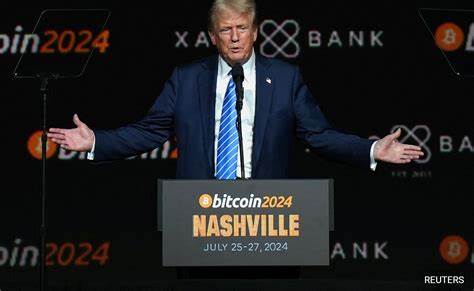Economy
Trump’s Vision for a “Bitcoin Superpower” Sparks Shift in U.S. Banking and Crypto Integration
Trump’s vision for a “Bitcoin: Following the collapse of FTX and the downfall of two major crypto-leaning banks, traditional finance institutions distanced themselves from the cryptocurrency sector two years ago. The aftermath of these events led to tighter regulations, curbing further crypto integration into the banking system. However, recent developments signal a major shift in the landscape.
Trump’s Crypto Vision Drives Change in Financial Sector
Former President Trump’s promise to turn the U.S. into a “bitcoin superpower” has paved the way for cryptocurrency to gain a stronger foothold within the traditional banking system. This vision is spurring interest from cryptocurrency firms to pursue new opportunities for collaboration with established financial institutions.
Crypto Firms Eye Bank Charters and Licenses
Several cryptocurrency companies, including Circle and BitGo, are reportedly preparing to apply for bank charters or licenses, insiders revealed. Notably, prominent crypto exchange Coinbase Global and stablecoin issuer Paxos are also exploring similar pathways to gain official regulatory approval and integrate more closely with mainstream finance.
Legislative Push for Stablecoin Regulation
As the Trump administration pushes for greater crypto adoption, Congress is advancing legislation to create a regulatory framework for stablecoins. These digital currencies enable users to trade more easily between volatile cryptocurrencies. Proposed bills would require stablecoin issuers to secure charters or licenses from regulators, aiming for a more structured regulatory environment.

International Investors Drive Record in U.S. Debt
International investors of U.S. Treasury bonds rose by $290 billion in February, marking the largest monthly…
Crypto Firms Seeking Bank-like Charters
Some crypto companies are eyeing national trust or industrial bank charters to operate similarly to traditional banks. These charters would allow firms to accept deposits, offer loans, and extend other financial services. Others are targeting specific licenses for issuing stablecoins, solidifying their place within the evolving regulatory landscape.
World Liberty Financial’s USD1 Stablecoin Plans
A new crypto initiative, World Liberty Financial, backed by the Trump family, has announced plans to launch a stablecoin called USD1. The project intends to back the stablecoin’s reserves with crypto custodian BitGo, which is reportedly nearing the submission of its bank charter application. This move could further solidify the intersection of crypto and traditional banking.
Bank Charters Bring Stricter Regulatory Scrutiny
Obtaining a bank charter comes with significant regulatory challenges. Anchorage Digital, the only U.S.-based crypto firm with a federal bank charter, has spent millions of dollars to comply with regulatory requirements. The company faced a consent order for anti-money-laundering deficiencies, underscoring the tough road ahead for any crypto firm seeking a bank charter.
Traditional Banks Showing Growing Interest in Crypto
Despite earlier hesitations, traditional banks are increasingly exploring crypto opportunities. Bank of America CEO Brian Moynihan has expressed that his bank would issue a stablecoin once a legal framework is established. U.S. Bancorp is relaunching its crypto custody service in partnership with NYDIG, a bitcoin trading firm. Meanwhile, global banks like Deutsche Bank and Standard Chartered are investigating the expansion of their crypto operations in the U.S.
KeyBanks’ Cautious Approach to Crypto
While some banks are embracing crypto, others remain cautious. KeyCorp CEO Chris Gorman emphasized the potential competition posed by crypto but noted that his bank prefers to monitor developments closely. He highlighted regulatory challenges, particularly around anti-money-laundering measures, pointing out the difficulty in tracing transactions beyond early developments.


